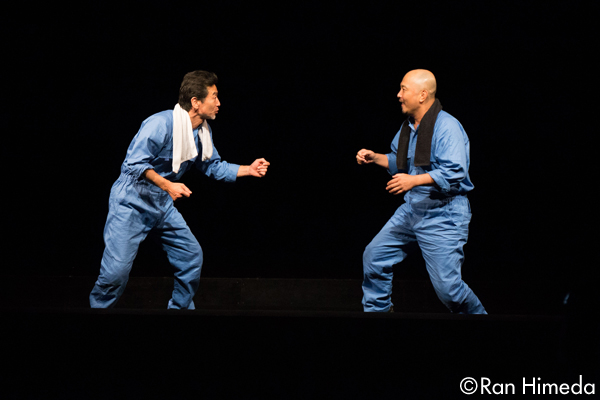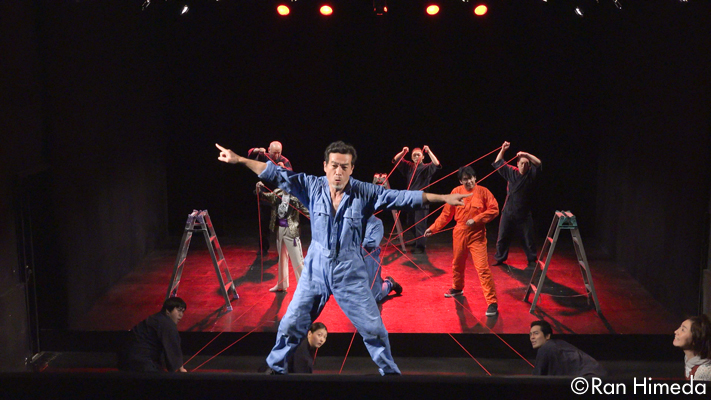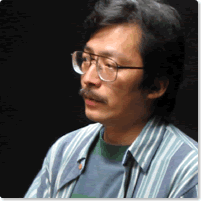

RINKO-GUN
Go-n-do-la,La-do-n-go
(Jul. 16 – 31, 2016 at Shimokitazawa The Suzunari) Photos: Ran Himeda
Data
:
Premiere: 2016
Length: 2 hr., 30 min.
Cast: 16 (7 men, 9 women)
Go-n-do-la, La-do-n-go

Born in 1962, Sakate started the Theatre company RINKO-GUN in 1983. He has been in charge of the writing and directing for almost all this troupe\’s works since that time. In 1999, he studied in New York on an ACC grant. Sakate has also engaged in writing and directing outside the troupe, and has issued a number of collections of his criticism and plays. He has served as Director of the Japan Playwrights Association for ten years and as Director of the Japanese Theatre Directors Association, and as Director of the Japanese Centre of the International Theatre Institute. Sakate considers drama to be a variety of media and explores social problems from a journalistic perspective through themes of the conflict between the social collective and the individual. He has taken up such topics as the Okinawa issue, the Japanese Self-defense Force, religious issues, and so on. At the same time, Sakate has produced a series of exchanges with other genres, such as dance, music, and films, as well as a serial work about Yakumo Koizumi (the Japanese name of Lafcadio Hearn) that incorporates contemporary Noh forms. He has also been active internationally, with performances in 27 cities in 15 overseas countries, joint works with artists in other countries, and so on. He is the recipient of numerous directing and literature awards including the Kishida Drama Award, The Tsuruya Namboku Drama Award, the Yomiuri Literature Award the Kinokuniya Theatre Award, the Asahi Arts Award and the Outstanding Director Award of the of the Yomiuri Theatre Grand Prix, among others.
Theatre company RINKO-GUN
https://rinkogun.com/


RINKO-GUN
Go-n-do-la,La-do-n-go
(Jul. 16 – 31, 2016 at Shimokitazawa The Suzunari) Photos: Ran Himeda
Data
:
Premiere: 2016
Length: 2 hr., 30 min.
Cast: 16 (7 men, 9 women)
As these two no-longer-young men, Rock and Tora, go about their work in the gondola, they are talking. The topics include the accident suffered by one of their fellow workers and the latest news from the theater company Rock performs with. Then, as if questioning the worth of his present life, Rock says the words, “If it were possible to save all the people of the world in exchange for my life….” Next, Tora says with obvious delight that his elementary school-age daughter, Michi, took the word “gondola” that her father works on and used “mirrored syllables” to write “Go-n-do-la-La-do-n-go.” Finally, the day’s work is done, and the instant Tora presses the switch to start the gondola’s descent as always, the two men’s spirits are interchanged to reside anew in the other’s body; it is a complete body-swap.
On the way home from work, Rock (now in Tora’s body) stops as usual at his favorite pub for a drink. But, sensing something is wrong from the reactions of the familiar people there, he looks in the mirror and blurts out in shock, “I’ve disappeared.” As for Tora (now in Rock’s body), he arrives home to find his daughter Michi and wife Noriko reacting to him as if he were Rock, which causes him to become disorientated and distraught.
When Rock fails to show up that evening for the final rehearsal of the new play that will open the next day, his wife Sanae, who is now pregnant with their second child, goes to the pub he frequents in search of him, and when Tora (in Rock’s body) arrives instead, she and the theater company’s director, Hasegawa, rush him off to the rehearsal [naturally unaware that he is no longer the true Rock].
It is the new play’s opening performance, and Tora (in Rock’s body) has been made to stand on stage and pull on a rope that is one of the stage props. As he pulls, he lip-synchs words spoken by Rock (in Tora’s body): “If it were possible to save all the people of the world in exchange for my life….” This reveals that those words Rock had spoken by in the gondola were in fact a line from the play. In the play, the rope that Tora is pulling represents a system designed to save the world from the destruction of a nuclear power plant disaster.
Once again, Rock and Tora are at work in a gondola. Since the time that their spirits were interchanged, they had been living with this truth kept as their secret, telling no one. But finally, Tora (in Rock’s body) tells his real wife, Noriko, the truth and divorces Rock’s wife and remarries Noriko. Now unable to return home, Rock (in Tora’s body) abducts his real son, Toru, and disappears.
The era changes [with the death of the Emperor] from the Showa to the Heisei era. At the two’s building cleaning company, a number of the younger employees have been demanding a revision of the salary system and the working rules. With the death of Emperor in 1989, this group takes advantage of Japan’s economic bubble to quit and set up their own company.
While reading the “Notes for Riding a Go-n-do-la-La-do-n-go” that her father had given her long ago, Michi is practicing to be able to ride a gondola.
The next character to make her appearance is a woman named Hitomi who, like Rock and Tora, has acquired a different person’s spirit (residing in her body is the mind and soul of Shizuo Yamashita). In 1995, Hitomi and her lover, the author Shizuo Yamashita, were in a car accident. Shizuo died and his spirit entered Hitomi’s body. Because Hitomi (with that spirit abiding in her) wrote a novel based on this experience, she is hated by Shizuo’s widow, Tetsuko.
Six years have passed since Rock (in Tora’s body) disappeared. Japan’s economic bubble had burst, the Great Hanshin Earthquake had occurred and then the Tokyo subway sarin attack. As the times changed the company had suffered from the recession, Rock (in Tora’s body) had returned bringing Toru with him to “save the world.”
Hitomi (with the spirit of Shizuo inside her) talks about the changes the world has gone through from 1985 to the present (2016). Now, Hitomi is living with Tetsuko. Michi is now grown and has become an actress. She comes to visit Hitomi, who has experienced a spirit-swap, to ask for advice about what is troubling her.
Hitomi suggests that Michi try riding a gondola. Following the instructions in the nostalgic gondola notebook her father made for her, everyone watches hopefully as Michi attempts to ride the gondola, led by Rock (in Tora’s body) and Tora (in Rock’s body). As a little child, the first words that Michi learned were “reversed syllable words.” So, whenever she is lost or troubled, the first thing she tries is to think things through in reverse. Read normally (from the left), it is go-n-do-la. And, read in reverse (from the right), it is also go-n-do-la…. As in Michi’s memories from childhood, and as it did the moment Tora’s and Rock’s body-swap occurred, the gondola begins its descent.
The two men speak: “I am Rock, and also Tora.” “I am Tora, and also Rock.” Tetsuko finds her Shizuo in Hitomi. Rock says, “If it were possible to save all the people of the world in exchange for my life….” And Tora answers, “You’re right. Let’s save it—the world.” —The stage lights fade out.
Related Tags